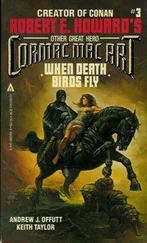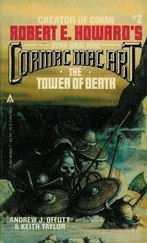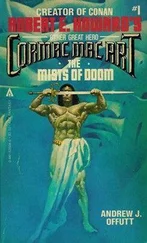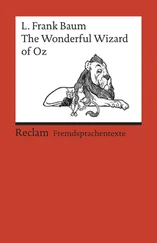Andrew Offutt - The Undying Wizard
Здесь есть возможность читать онлайн «Andrew Offutt - The Undying Wizard» весь текст электронной книги совершенно бесплатно (целиком полную версию без сокращений). В некоторых случаях можно слушать аудио, скачать через торрент в формате fb2 и присутствует краткое содержание. Жанр: Фэнтези, на английском языке. Описание произведения, (предисловие) а так же отзывы посетителей доступны на портале библиотеки ЛибКат.
- Название:The Undying Wizard
- Автор:
- Жанр:
- Год:неизвестен
- ISBN:нет данных
- Рейтинг книги:5 / 5. Голосов: 1
-
Избранное:Добавить в избранное
- Отзывы:
-
Ваша оценка:
- 100
- 1
- 2
- 3
- 4
- 5
The Undying Wizard: краткое содержание, описание и аннотация
Предлагаем к чтению аннотацию, описание, краткое содержание или предисловие (зависит от того, что написал сам автор книги «The Undying Wizard»). Если вы не нашли необходимую информацию о книге — напишите в комментариях, мы постараемся отыскать её.
The Undying Wizard — читать онлайн бесплатно полную книгу (весь текст) целиком
Ниже представлен текст книги, разбитый по страницам. Система сохранения места последней прочитанной страницы, позволяет с удобством читать онлайн бесплатно книгу «The Undying Wizard», без необходимости каждый раз заново искать на чём Вы остановились. Поставьте закладку, и сможете в любой момент перейти на страницу, на которой закончили чтение.
Интервал:
Закладка:
“This far south? What be Picts doing this far south of their damned heather?”
“Or this far east,” Bedwyr said. “Mayhap they be Picts from far side Hibernia.”
Silent had been the third man who was not rowing, and him nigh-naked. Now he spoke.
“ Eirrin , ye corn-headed ass. Eirrin! Ye talk like a Roman… miss ye your masters so much, ye Briton molester of ewes?”
The blond at the prow turned to stare at the speaker. He was a great burly giant of a man with a red mane and full bushy beard.
“Ye talk foolishly free for a man bound to a ship’s mast, Dane! Be ye so anxious to be oped up for the sun to bake your drunkard’s gizzard?”
The bound man grinned. He wore only a dirty tunic that had been red before its dyes succumbed to wear and sun and salt water and sweat. Now, but for the soil, it was lighter in colour than his full beard.
“It were better than having to list to your stupidity, Briton.”
Bedwyr of Britain cheated his captive, who was bound so that he must remain standing and stare straight ahead, like a strange bow ornament moved back amidships. The blond Briton only grinned, and turned away.
“Row. An they see us, they all be far too busy-and about to be busier still-to trouble us. Nor need we have worry of them.”
The oarsmen rowed. The ship of Britons-and captive Dane-swept on to the south and east, well east of the Eirrinish craft “leaguered about by wolves.”
Aboard that beleaguered ship from the land of Eirrin, caught by the same calm and now by the swift boats of its harriers, a man watched the vessel from Britain. A tall, rangily built man he was, deep-chested and manifestly strong, his eyes deeply planted and slitted, grey as steel or ice. The distance was too great for faces to be seen; had there been aught of the crew of the other craft he knew, he’d not have recognized him. The hair of the ax-man at the prow seemed sunwhite from this vantage.
“They go on.”
The words came from the warrior beside the tall and rangy man; this one was both short and slight, and wearing a bronze-studded leathern cap that covered brow and cheeks, ears and nape.
“Aye. Ours be no business of theirs. It’s a broad sea, and it bears up many peoples. Those be neither Gaul nor Pict, and if it’s Celts they are-not likely-it’s not from Eirrin but Britain they sail.”
“Britain!” called up one of the men at the oars. “The Britons be no seafarers!”
“Some fare asea.”
The small beardless warrior spoke nervously: “Could… might their destination be the same as ours?”
“No no, dairlin’ girl,” the tall man said. He too was beardless, his narrow-slitted eyes giving him a peculiarly sinister aspect. Though he was of Eirrin, his squarecut hair was black as the shaggy mops of the men in their hideboats round about them. He wore neither beard nor jewellery.
He went on, “How could they be knowing of it? Samaire-heim be not known in their land-nor any other, save wherever it is Wulfhere may be. Nay, they be reavers as I was, though Crom and Manannan only know what they do so far south-HA!”
His shout was elicited by the arcing up of an arrow from one of the little hideboats that sought to encircle his vessel of fourteen oars; the flint tipped shaft fell short.
“HA!” the tall man barked out again. “Try on, Picts-once one of ye comes close enough to bounce one of your puny sticks off this ship, I’ll huff and puff until I blow over your snailshell!”
A cry of rage was the reply from the archer; the dark, squat men of Pictdom were not known for sense of humour.
In the Irish craft, a man called. “A fine threat, Cormac. But… what do we do? There be fourteen of these ‘snail-shells’ as ye’re after styling them, and us between them like a man running the Behlfires!”
The dark man named Cormac looked about.
Two Pictish boats trailed the little ship he commanded. Six paced it on either side. They might have been an escort, save that the Picts were friend to none in the world but themselves. Cormac knew that an ancestor of his had been friend and fighting companion to the last great Pictish king, Bran Mak Morn, years ago. That meant nothing now, either to the squat swarthy men or to the current bearer of the name Cormac mac Art of Connacht in Eirrin.
Small were the Pictish boats, of well-scraped hide rubbed with butter so that they were as if faced with glass that sparkled in the sun flashing on the placid waters. In each were two Picts, armed with spear and knife-and oar. A few had bows and arrows. The two-man craft were light and swift-gliding. Full a hand’s breadth had the sun moved in the sky since the little flotilla had intersected the ship’s course. Nor did the barrel-chested rowers seem in the least winded, nor minded to abandon their odd, paralleling chase.
“Ah for a wind,” Cormac said with anger and longing, “a wind , that we might leave behind these apish scum from Time’s dawn who seek our very hearts!”
He glowered ferociously about at the ringing skinboats, de curucis or curraghs: caracks. All remained just outside the distance to which any sensible man would seek to speed a spear. And few used the bow, which was a hunting tool, rather than a weapon of war.
Cormac snapped, “A-port!”
The steersman responded at once. Swiftly his craft began to move away from the caracks on their right. Nearly as swiftly, the Pictish boats to port swung away, nimble little craft rowed by experts.
In his anger and desperation Cormac himself snatched up arrow and bow of yew and sent a shaft at that skinboat which seemed nearest. The Picts howled in derision; Cormac mac Art was an indifferent archer at best.
“What do we do? ”
Cormac looked at the short, leather-capped warrior at his side. “Row,” he said, in a snarl. “Go on. And hope for wind! ” He glanced half the length of the ship at the druid.
The man in the robe of forest green either did not notice, or affected not to feel the accusing gaze. But he made answer, staring straight before him as though talking to himself.
“Behl and Crom,” he said, “cede power asea to Manannan mac Lyr and the Morrigu of the waves. And Manannan, as all seafarers know, is deaf from the roar of the surf.”
Cormac blinked. “In all my years asea,” he muttered, “I never heard that .”
The warrior beside him smiled, but wisely kept silent.
“CORMAC!”
The Gael spun at the alarmed shout of his name. Seeing the pointing finger, he wheeled. The Pictish boats to starboard, all six, were closing on his ship. Cormac’s reaction was not understood by those possessed of more patience and less experience and warlike joy than this Gael among Celts: Cormac grinned.
“Lugh!” he snapped. “Ferdiad!”
With grunts Lugh and Ferdiad shipped their oars, Ferdiad the first to starboard, Lugh the last. So had Cormac placed them, after giving both careful instructions and some small rehearsal. These two were better archers than their comrades along that side, and they knew their duties. Each man snatched up bow and clapped on helmet; each wore a jerkin of well-boiled leather, and long bracers on both arms.
Lugh and Ferdiad moved quickly into position at the starboard hull’s bulwark, looked, ducked, nocked, pulled string, rose, released, ducked again. The shafts may perhaps have taught some small respect; otherwise they were ineffective.
Cormac’s grin faltered not. He’d trained these two hunters well. No sooner were they again hunkered below the top of the bulwark than four arrows whished over their heads. The Pictish shafts passed completely over the ship. One persuaded a portside oarsman to helmet himself.
“HARD A-PORT!” Cormac bawled.
Читать дальшеИнтервал:
Закладка:
Похожие книги на «The Undying Wizard»
Представляем Вашему вниманию похожие книги на «The Undying Wizard» списком для выбора. Мы отобрали схожую по названию и смыслу литературу в надежде предоставить читателям больше вариантов отыскать новые, интересные, ещё непрочитанные произведения.
Обсуждение, отзывы о книге «The Undying Wizard» и просто собственные мнения читателей. Оставьте ваши комментарии, напишите, что Вы думаете о произведении, его смысле или главных героях. Укажите что конкретно понравилось, а что нет, и почему Вы так считаете.











